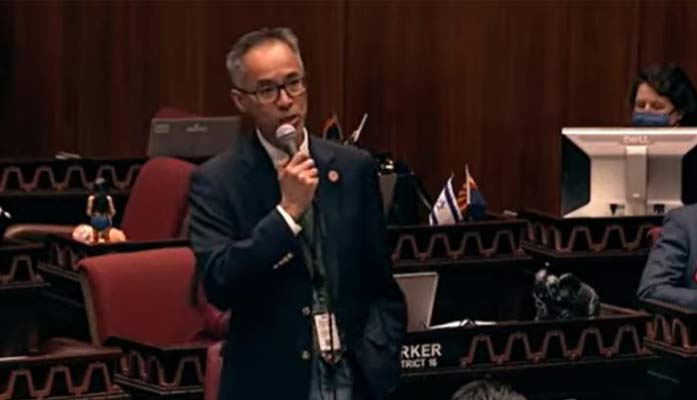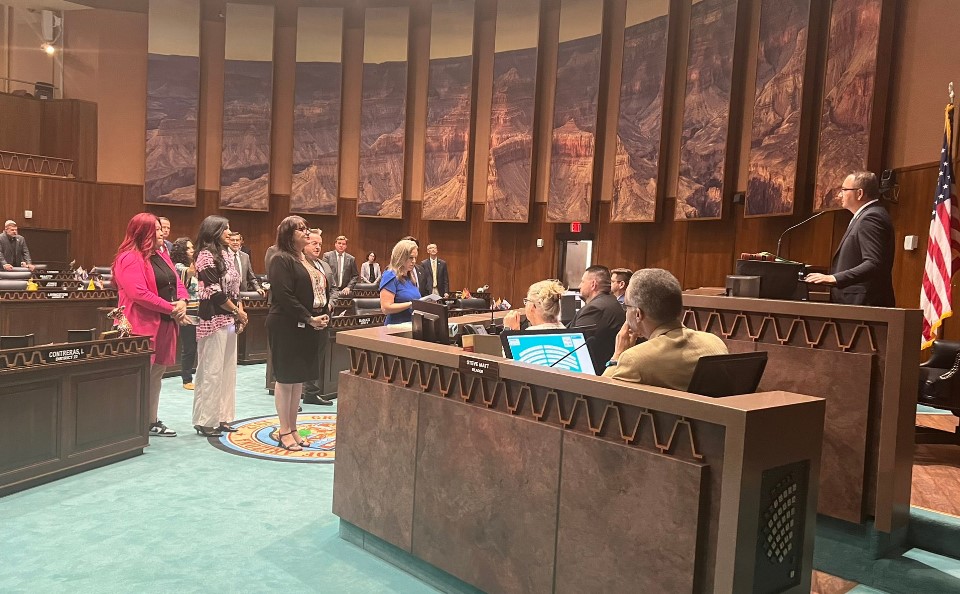
by Corinne Murdock | Aug 3, 2023 | News
By Corinne Murdock |
Democratic leadership and Biden officials split with their go-to election lawyer, Marc Elias; a 2021 Supreme Court loss from Arizona served as a major catalyst for the breakup. In that case, Brnovich v. Democratic National Committee, the court effectively gutted the federal Voting Rights Act by upholding Arizona’s restrictions on out-of-precinct voting and ballot harvesting.
Although Elias and Democratic leaders parted ways in April, it wasn’t until this past week that details of the split came to light.
According to unnamed sources who spoke with Axios, Elias went rogue in the Biden administration’s eyes: filing lawsuits without notice or consent, with Biden leaders only learning of them via social media or mainstream reporting; racking up large bills, such as the $20+ million payout from the Democratic National Committee (DNC) and the Biden campaign for defending the 65 lawsuits challenging the 2020 election results; and public criticism of a bipartisan election bill crafted by key Biden leadership and Democrats.
Elias’ tactics also differed from the reported desires of Biden leadership. While Elias viewed all fights as worth taking up, Biden officials wanted to be more selective.
Elias was a longtime legal bulldog for the DNC. In 2016, Elias served as general counsel for the 2016 campaign of presidential nominee Hillary Clinton. Following Clinton’s loss, Elias served as a principal player in the Russiagate scandal. As Clinton’s general counsel, Elias billed for his hire of the opposition research firm, Fusion GPS, that created the Steele dossier: the Russian collusion allegations against former President Donald Trump leaked to Buzzfeed ten days before Trump’s inauguration that became a shadow over Trump’s entire presidency.
In 2020, Elias’ work resulted in key reforms to election law that lent to Democratic victories and the defense of challenges to President Joe Biden’s election.
As AZ Free News reported last November, Elias’ firm launched in 2021, Elias Law Group, was a listed address for the Black Lives Matter headquarters. The firm stated in the latest BLM’s IRS filing that it maintains all of BLM’s books and records. According to Federal Elections Commission (FEC) records, the Black Lives Matter PAC paid Elias’ firm over $14,800 from January to December of last year. Per their latest FEC filing on Monday, BLM has paid Elias’ firm nearly $3,000 so far this year.
One of the other main recipients of the BLM PAC’s disbursements is Premier Political Compliance founded and led by the former compliance director Christine Neville of the Perkins Coie firm, where Elias served as partner prior to launching his own firm. Both Neville and Elias departed Perkins Coie to launch their respective firms in 2021.
Elias has increasingly positioned himself as a public figure on the topic of election law and, as evident by working with BLM, other social issues. He has appeared in numerous interviews and maintained a consistent social media presence.
Last year, however, Elias deleted all tweets prior to April 4 without explanation. Around that time, federal investigators began to close in on those behind Russiagate. About a month before Elias purged his Twitter, the FEC fined the DNC and Clinton $113,000 for misrepresenting payments for opposition research used to create Russiagate.
Biden’s former chief of staff and re-election campaign leader, Ron Klain, said that relations between Elias and Biden leaders remain amicable despite the split.
Corinne Murdock is a reporter for AZ Free News. Follow her latest on Twitter, or email tips to corinne@azfreenews.com.

by Daniel Stefanski | Aug 2, 2023 | News
By Daniel Stefanski |
One of the final pieces of the 2023 Arizona Legislative Session has been put into place.
On Tuesday, Governor Katie Hobbs signed SB 1131, which eliminates the rental tax for Arizona tenants.
According to Arizona Senate Republicans, “there are approximately 70 municipalities within our state charging this tax, while cities and towns continue to collect record revenues. From fiscal years 2019 to 2023, state-shared revenues from both sales and income taxes combined grew $733 million, or 59%. This increase is on top of any sales taxes or property taxes individually levied by each city. Between FY 2024 and FY 2025, those shared revenues are expected to grow by an additional $389 million.”
The Senate’s President, Warren Petersen, issued the following statement in conjunction with the announcement: “Charging a rental tax is bad tax policy. In fact, Arizona is one of only two states in the nation currently allowing this. While our first attempt at eliminating the tax passed out of the Legislature with solely Republican support and was eventually vetoed by the Governor, we’re grateful our Democrat colleagues came to the table with us and realized the real tangible relief this reform will provide.”
Senate Majority Whip Sine Kerr also released a statement explaining the need for the bill.
“Rental prices aren’t going down anytime soon, and Arizona tenants are agonizing over just how much more expensive it is now to rent an apartment or house than ever before. For Metro Phoenix, June of this year saw the second-highest monthly total of evictions since the 2008 Great Recession. According to Maricopa County records, landlords filed to evict nearly 7000 times last month,” said Senator Kerr. “We needed to act promptly. This bill will provide some help, and I’m proud the Majority Caucus spearheaded this change in tax policy.”
The Republicans’ press release noted that the new policy will “take effect on January 1, 2025…at the request of Democrats (to) allow cities and towns the leeway they desire to adapt to this tax reform.”
As Petersen referenced, the governor vetoed an earlier version of the rental tax prohibition back in February. Hobbs gave two reasons for her action, stating, “First this bill lacks any enforceable mechanism to ensure relief will be provided to renters. As noted by the legislature’s own attorney, provisions in the bill that purport to require that tax savings be passed on to renters face challenges under both the state and federal constitutions. If we are going to promise relief to renters, it’s important that we are able to ensure they actually receive it.”
The League of Arizona Cities & Towns – as well as several cities and towns across the state – opposed the updated bill, which was eventually signed by Hobbs, as it progressed through the state legislature. The Senate first passed the bill on March 2, then the House on May 15. The Senate then concurred with the amended proposal on June 13. SB 1131 was not transmitted to Governor Hobbs until July 31 – the same day that the Legislature approved the negotiated Prop 400 plan.
Daniel Stefanski is a reporter for AZ Free News. You can send him news tips using this link.

by Corinne Murdock | Aug 2, 2023 | Education, News
By Corinne Murdock |
Arizona State University (ASU) faculty behind a campaign against the now-dissolved T.W. Lewis Center asked to be added to a watchlist of professors who discriminate against conservative students, emails reveal. Those faculty members later cried foul for their inclusion on the watchlist.
In emails shared with Arizona Sun Times, a Barrett Honors College faculty member requested his addition to the professor watchlist, a product of the Phoenix-based conservative advocacy organization Turning Point USA (TPUSA). That faculty member, professor Mike Stanford, emailed former T.W. Lewis Center executive director Ann Atkinson to request that she forward his request to TPUSA.
“I thought, ‘Why should my colleagues get all the glory? What am I, chopped liver?’ I even filed a ‘tip’ about myself on the website. Yet to no date, no joy,” stated Stanford. “I respectfully request that you direct your minions to add me to the Watchlist. It seems only fair.”
ASU closed the Lewis Center following the principal funder’s decision to withdraw his backing over the “left-wing hostility and activism” of a majority of Barrett Honors College faculty. The faculty launched a campaign with a letter to oppose the invitation of the three conservative speakers at the event: Charlie Kirk, founder and president of TPUSA; Dennis Prager, radio talk show host and founder of conservative educational group PragerU; and Robert Kiyosaki, author and PragerU presenter.
Since then, several of those involved in the controversial event have come forward alleging retaliation for their involvement. The Arizona legislature ordered an investigation into the ordeal, specifically to review whether free speech violations had occurred.
Stanford received further endorsement for inclusion on the anti-conservative watchlist from another signatory, professor Michael Ostling. Ostling’s role in the campaign against the Lewis Center event resulted in his inclusion on the professor watchlist. Ostling called the watchlist an “honor” for him and his colleagues.
“It is thus only fair that he should be honored, along with his colleagues, as a Professor in need of Watching,” wrote Ostling.
Yet, Ostling and fellow Barrett signatories Jenny Brian and Alex Young alleged months later in an Arizona Republic opinion piece that their inclusion on the watchlist resulted in threats of violence. The three professors also argued that those who reject inclusivity were a threat to debate and, therefore, should be barred from public discourse.
Democratic Sen. Christine Marsh (LD04) further claimed that it was faculty members’ fear over the Professor Watchlist that caused them to decline to testify at last month’s state legislature’s joint committee hearing on allegations of free speech violations at ASU.
ASU has 42 faculty members listed on the Professor Watchlist. Among those 42 are the 39 of 47 Barrett faculty members who signed onto the letter opposing the Lewis Center event: Abby Loebenberg, Abby Wheatley, Adam Rigoni, Alex Young, April Miller, Benjamin Fong, Christiane Fontinha de Alcantara, Dagmar Van Engen, David Agruss, Don Fette, Elizabeth Meloy, Gabriella Soto, Georgette Briggs, Irina Levin, Jacquie Scott, Jennifer Brian, John Lynch, Joseph Foy, Joseph O’Neil, Laura Jakubczak, Laurie Stoff, Lisa Barca, Mathew Sandoval, Matthew Voorhees, Michael Ostling, Mina Suk, Nilanjana Bhattacharjya, Peter Schmidt, Phillip Cortes, Rachel Fedlock, Rebecca Soares, Robert Mack, Sarah Graff, and Taylor Hines.
The University of Arizona has nine faculty members included on TPUSA’s watchlist, and Northern Arizona University has two.
Corinne Murdock is a reporter for AZ Free News. Follow her latest on Twitter, or email tips to corinne@azfreenews.com.

by Corinne Murdock | Aug 2, 2023 | Education, News
By Corinne Murdock |
High schoolers will learn from firsthand experiences of the evils of communism in a documentary series featuring two Arizona lawmakers who survived it.
The series, produced by the University of Arizona (UArizona) Center for the Philosophy of Freedom, features House Speaker Ben Toma (R-LD27) and Rep. Quang Nguyen (R-LD01) sharing their personal accounts of communism and their emigration to America. Toma escaped from Romania, and Nguyen escaped from Vietnam.
Nguyen praised UArizona for granting war survivors like him a platform to enlighten future generations.
The videos were created in response to the state legislature passage of a bill sponsored by Nguyen last year requiring high schools to incorporate a comparative discussion of political ideologies: the principles of communism and totalitarianism compared and contrasted with America’s founding principles.
Nguyen recounted how, a week before the Fall of Saigon, his father boarded him and his brother on an airplane with hundreds of other people. Nguyen was 12 years old at the time; his father advised the brothers that they wouldn’t see their family again. He and his brother were transported to Subic Bay, then Guam, then to Travis Airforce Base, Fort Pembleton, and finally Fort Chaffee.
However, Nguyen and his brother were able to reunite with his family in San Joaquin, California. Nguyen explained that he only ever experienced kindness among American military members, contrary to the narratives he heard that the U.S. forces had invaded his country. To this day, Nguyen says he visits with Vietnam veterans nationwide to thank them.
The representative shared that his quality of life in America was better than in Vietnam: he was able to get a strong college education and well-paying employment as a young man.
Nguyen explained that hallmarks of communism include government control of food source, specifically severely limiting the supply; control of education, specifically focusing on propagandizing children; and confiscation of weapons.
Toma’s video includes his mother and father, Ana and Cornel Toma. They recounted how the Romanian secret police labeled their family as an enemy to the government.
Ana recalled how government indoctrination in schools taught her and her peers false history, such as that the rest of the world loved and admired Romania as a great nation, when in fact she would later learn that few Americans knew of Romania’s existence. Ana also recalled waiting in lines for hours to obtain food, sometimes reaching the front without receiving the few rations available.
Cornel recalled how the government took away people’s cattle and land, only allowing them one cow and a half-acre of land. Those who dared speak out would “disappear overnight.” The government also didn’t allow people to have vocational freedom: similar to the military, the government assigned citizens their vocations and where they would live.
The Toma family was forced to flee Romania after the Secret Police began visiting them. They only managed to escape after a family friend convinced a member of the secret police to assist in smuggling them out of the country under the guise of a vacation: at that point, the Toma family wasn’t allowed to leave the country otherwise. Ana and Cornel were forced to escape first, then send for their children.
Ana and Cornel navigated the legal immigration process for admittance to the U.S., traveling across Turkey, Greece, Italy, and Rome over the course of about a year. Ana said that, upon first landing in America, she witnessed a novel display of patriotism and love for America that touched her deeply.
“I was so impressed that somebody love the country so much. I was impressed by the attitude they had on the flight. I thought, ‘This is the first taste of freedom,’” said Ana.
The Toma family settled in a two-bedroom apartment for their family of seven. Speaker Toma shared his delight in the abundance of America through the simple joy of eating oranges: something not possible in Romania. Ana and Cornel shared that they found work rather quickly.
In addition to Toma and Nguyen, the series will include Mesa Community College economics professor Sylwia Cavalcant, who fled Poland’s communism.
Freedom Center Director Mary Rigdon said that the series would serve to advise students of the realities of communism.
“The mini-documentaries powerfully demonstrate our commitment to inform current and future generations, consistent with the Center’s mission to be an intellectually diverse, inclusive, and nonpartisan resource for leaders and students seeking to address society’s significant challenges. We appreciate the opportunity to highlight the power of freedom in a democratic society,” said Rigdon.
Watch the documentary series here.
Corinne Murdock is a reporter for AZ Free News. Follow her latest on Twitter, or email tips to corinne@azfreenews.com.

by Daniel Stefanski | Aug 2, 2023 | News
By Daniel Stefanski |
Another Arizona legislative session has come to an end.
On Monday, the Fifty-sixth Legislature – First Regular Session Adjourned Sine Die.
Many lawmakers and staff took to social media to share their thoughts about the end of the session.
It was an eventful session for the Arizona Legislature as the state experienced a divided government for the first time in over a decade. Though it appeared, at times, that the Republican-led Legislature and the Democrat Governor would not accomplish their required business (for example, the new budget or Prop 400), both sides made concessions and reached accords.
Republicans in the Legislature were led by Senate President Warren Petersen and House Speaker Ben Toma. Petersen and Toma, along with their chiefs of staff Josh Kredit and Michael Hunter, ensured that their respective Republican caucuses were mostly united and on the offensive against Hobbs’ desired progressive agenda. One of the most significant victories of the year was the Legislature’s defense of the Empowerment Scholarship Accounts program, which has been under tremendous political assault since it was expanded in 2022.
While Governor Hobbs had a turbulent time in her first seven months in office (just in the staff turnover alone on the Ninth Floor of the Executive Tower), she claims to have managed to maneuver past a severe learning curve to work with Republican legislative leaders on key issues affecting the state.
Daniel Stefanski is a reporter for AZ Free News. You can send him news tips using this link.

by Daniel Stefanski | Aug 1, 2023 | News
By Daniel Stefanksi |
Reaction was mixed to the news that the Arizona Legislature passed a Prop 400 compromise on Monday, after an agreement was forged with the Governor’s Office.
Republican Senate President Warren Petersen claimed victory after his chamber gave the proposal the green light, calling it “the most conservative transportation plan in our state’s history.” Petersen added, “The guardrails, taxpayer protections and funding allocations in the text of this bill reflect the priorities of voters, to reinvest their tax dollars in the transportation modes they use most.”
Democrat Governor Katie Hobbs was diplomatic in her statement, saying, “Today, bipartisan leaders invested in the future of Arizona families, businesses, and communities. The passage of the Prop 400 ballot measure will secure the economic future of our state and create hundreds of thousands of good-paying jobs for Arizonans. I am glad we were able to put politics aside and do what is right for Arizona.”
Some legislative Democrats took the legislation’s approval to point political fingers at their Republican counterparts. Senate Democratic Leader Mitzi Epstein wrote, “As is customary, Republicans have waited until the very last minute to pass widely popular legislation that invests in the daily lives of Arizonans….Our state should not have had to wait until July 31st to see this measure, which has had legislative support since the start of session, get sent to the ballot. However, with the support of Arizonans cities and towns, I am proud to join my Democratic colleagues in delivering the key votes needed to send the extension of the regional transportation tax back to the voters of Maricopa County.”
Members of the Arizona Freedom Caucus were adamantly opposed to the bill since the weekend, when they appeared to have read a draft of the legislation. After Prop 400 passed, the Freedom Caucus tweeted, “Legislative conservatives near unanimously opposed this horrible bill. Conservative watchdog groups unanimously opposed it. The bill may have been better than the communists at @MAGregion’s horrific plan, but that’s a ludicrously low bar for success. This bill was antithetical to conservatism.”
Freshman Republican Representative Austin Smith, who has become one of the leading voices in the Arizona Freedom Caucus this legislative session, was one of the most-outspoken members against the bill since the weekend. He explained his vote on Twitter, posting, “I voted NO on the prop 400 transporation excise tax for Maricopa County. Taxpayer dollars are not ours to dish out haphazardly – especially to the tune of 20 BILLION dollars with potential consequences that ruin valley transportation.”
Some legislative Republicans, including Representative Jacqueline Parker, were already thinking about messaging against the ballot measure in hopes that voters could stop the plan from becoming finalized. Parker tweeted, “Now it’s up to the voters in Maricopa county to read the 47 page bill & see if it’s worth $20 Billion. I recommend looking at provisions on pages: 8, 15, 16, 18, 21, 22, 34, & 35, which absolutely allow plenty of leeway for cities to implement their road diet, & transit expansion.”
The breakthrough on the Prop 400 compromise took place after Governor Hobbs vetoed a Republican proposal in June. At that time, Hobbs stated, “I just vetoed the partisan Prop 400 bill that fails to adequately support Arizona’s economic growth and does nothing to attract new business or create good-paying jobs.”
In May, the governor created unrest over ongoing negotiations, allegedly sending out a tweet that highlighted her fight with Republicans at the Legislature at the same time she was meeting with Senate President Warren Petersen.
Petersen, one of the most conservative members in the state legislature, championed the importance of the bill, asserting that officials had “secured a good, responsible product for the citizens of Arizona to consider in 2024, giving voters the option to enhance critical infrastructure that our entire state relies upon.”
Daniel Stefanski is a reporter for AZ Free News. You can send him news tips using this link.






